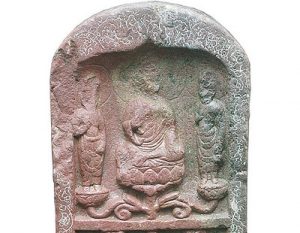
This essay was first published in the April 2020 issue of the newsletter of 84000: Translating the Words of the Buddha, a non-profit global initiative to translate the words of the Buddha and make them available to all. It has been reproduced here with permission. Click here to subscribe to the newsletter.
As we celebrate our 10th anniversary and look forward to the ways in which we can bring the words of the Buddha to the widest possible audiences in languages they can understand, our founding chair, Dzongsar Khyentse Rinpoche, shares with us the beneficial potential of today’s continually evolving technology and how it can—and should—be put to good use.
The Buddha himself taught that texts, representations and teachings on great compassion (mahākaruṇā), dependent arising (pratītyasamutpāda), and emptiness (śūnyatā) are extremely precious in whatever form they may manifest.
Just relating or associating with such texts and teachings without even reading or contemplating their profound meaning, but simply by having them in a temple or in one’s room, wearing them, or simply respecting them by placing them on one’s head or circumambulating them—all that is said to create merit far greater than paying homage to thousands of buddhas for aeons.
And yet, in ancient times, such texts were extraordinarily difficult to access. We need only recall Vairotsana’s and Xuanzang’s arduous trips to India to realize that the search for the true Dharma could even be life-threatening. And at the most practical level, how incredibly long it took to painstakingly inscribe texts by hand on fragile palm leaves, let alone to distribute them in ways that inevitably restricted their use to the fortunate few.
With each advance in technology, needless to say, the Buddha’s disciples took full advantage of stone carving, woodblock printing, calligraphy, and paper printing to preserve and share the Buddha’s teachings more widely and effectively. In fact, Buddhists were pioneers in this use of technology: the ninth century Vajracchedika Sutra in the Chinese translation found at Dunhuang remains the world’s earliest known example of block printing.
How incredibly fortunate we modern people are in this day and age to have instant access to a vast collection of the Buddha’s wisdom and to be able to share that treasure in a way never before possible. How amazing that the entire world, from its remotest and most far-flung corners, can now access the Buddha’s words with the click of a finger!
Yes, we rightly bemoan the misuse of social media and the rapid spread of bad news, misinformation, violence, and malicious gossip. But can’t we be a bit smart by applauding these same methods as ways to counter those negative trends, to tell the truth of the Dharma and to create untold benefit?
Can’t we imagine a teenager on the subway, wanting to be cool and perhaps too shy to take out a sutra text too bulky for his backpack, instead reading about śūnyatā and compassion on his smartphone? Imagine tiring of meaningless party conversation, retiring to the bathroom for a few minutes and reading a paragraph from a sutra on your phone. Or web browsing online shopping on your computer and momentarily flipping to a sutra. . . .
If the Buddha was right in proclaiming the value and power of these teachings in whatever form they appear, then no one can deny the tremendous merit and wisdom from even such sporadic modern encounters with the genuine truth!
Of course, for personal, artistic and devotional reasons, we may still copy a sutra in beautiful handwriting and cherish a print copy on our shrine and bookshelf. But there is also every reason to be brave and savvy in taking full advantage of the enormous opportunities afforded by modern technology.
In fact, we should all embrace these new possibilities with the greatest joy and enthusiasm, knowing that we can now preserve and propagate the Dharma so widely and effectively, and that we can make the Buddha’s words available more quickly, more easily, and more conveniently to more beings than ever before in human history. — Dzongsar Khyentse Rinpoche, March 2020















words from Theravada Tipitaka must reach all societies online for their welfare, happiness and peace. To overcome hunger the worst kind of illness just like free 🐦 🦢 🦅 birds latest technology must be used for all societies to grow 🥦 🥕 🥗 vegetables and fruits 🍌 🍎 🍉 throughout the world.